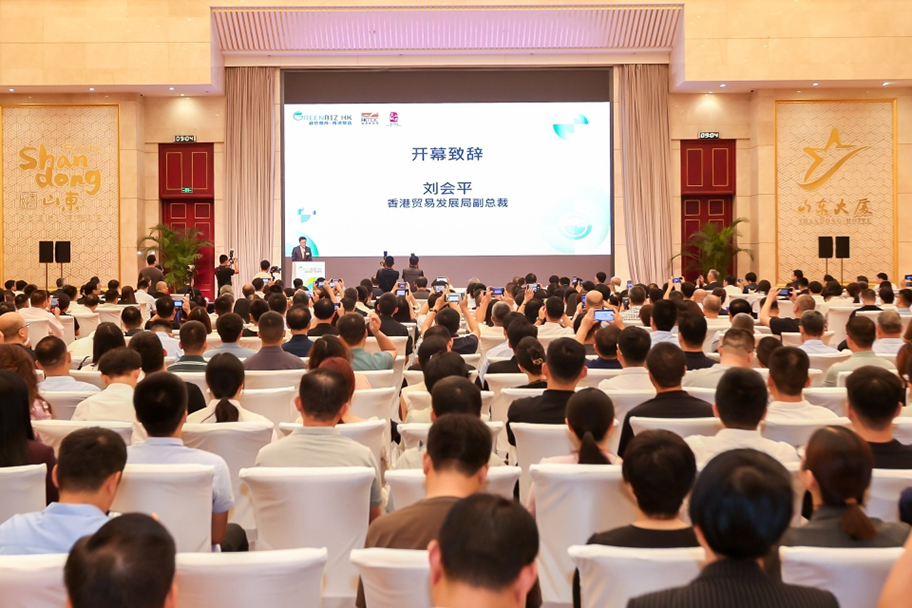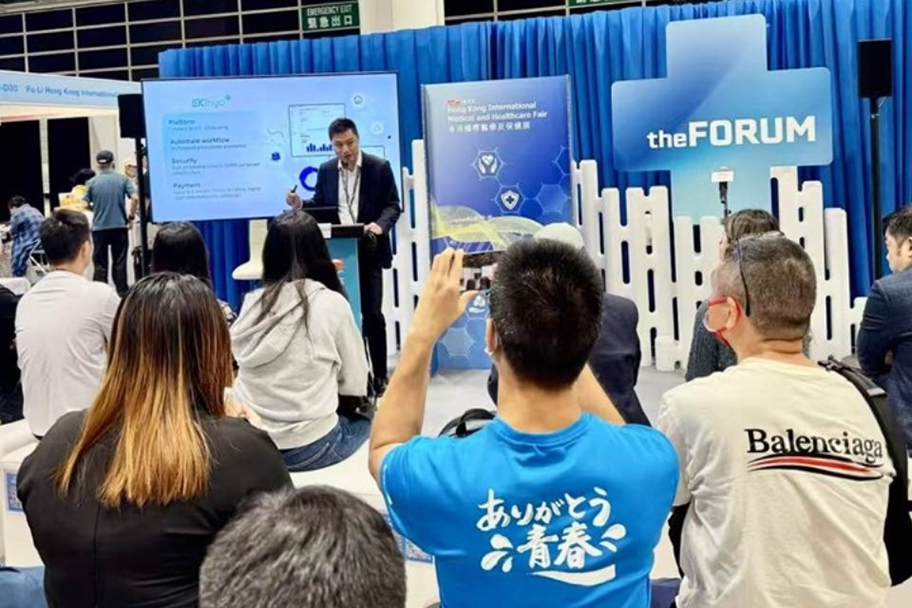Hong Kong: The Digital Silk Road Super-Hub
Executive Summary
This consultancy study – commissioned by the Hong Kong Trade Development Council and conducted by the project team formed from the three research centres, namely the University Research Facility in Big Data Analytics, The Smart City Lab and AMTD Fintech Centre of The Hong Kong Polytechnic University – aims to identify, from a macro perspective, Hong Kong’s strength and positioning in the Digital Silk Road Initiative to build a digital economy for the world.
Building of a Digital Economy for the World
The current era of digital transformation is not another dotcom bubble but a megatrend that brings fundamental changes to human society. Without overstating, it will be the name of the game in the future. The Digital Silk Road (DSR) Initiative aims to take the lead on this historic transformation for the betterment of the whole world. Through establishing a digital ecosystem for connection, inclusion, disintermediation and co-sharing along the Belt and Road countries, the DSR is set to reduce trade friction and increase efficiency, contributing tremendously to an inclusive growth of the global economy.
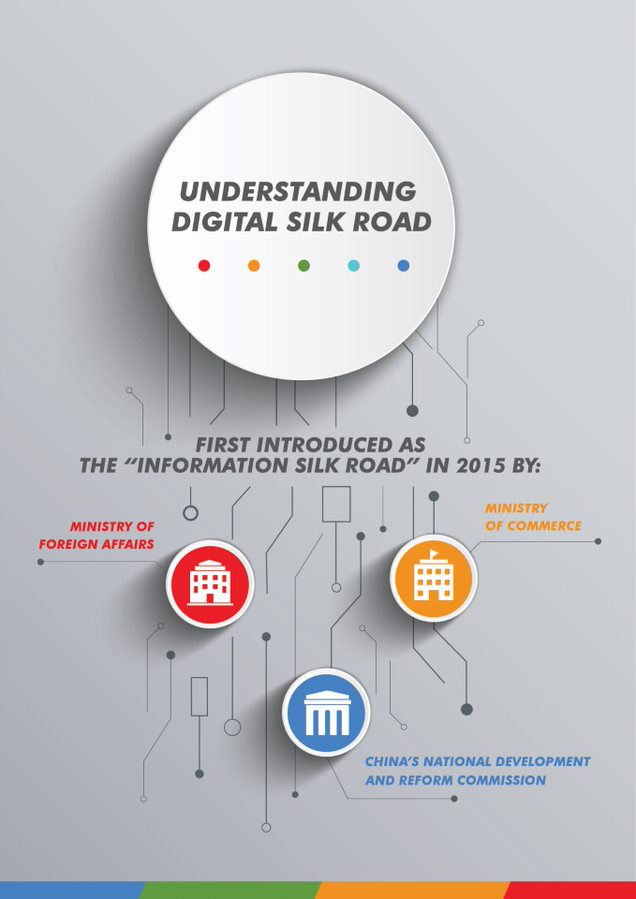
Prerequisites to the Success of the Digital Silk Road Initiative
A digital economy involves building a digital infrastructure including a cable network, satellite navigation and communication systems, 5G telecommunications, and digital technology such as artificial intelligence, big data analytics, etc.
Leading in many of these areas, Chinese companies are ready to contribute by exporting their technology to the world, but not without difficulties. Despite China growing at a tremendous pace in the past 30 to 40 years, its social environment, legal structure and corporate culture may not match well with those of the DSR countries, creating exchange barriers. Friction also exist as far as cross-border flows of capital, talent, technology and information are concerned.
Another requirement for the success of the DSR is the establishment of laws, policies and trade agreements to navigate the way in which data is transferred across borders. It also involves data ownership, data privacy and IP protection, which are highly sensitive issues.
_0.jpg)
Hong Kong’s Unique Role and Advantages
Hong Kong has a unique role in the DSR initiative. The city started its development as an entrepot, and has a long successful history as a bridge between mainland China and the rest of the world. Hong Kong can continue to play its super-connector role but, this time, it will play out on the digital superhighway, helping to bring China’s digital technology to DSR countries, while also helping them to tap into mainland markets. As such, Hong Kong could become the digital gateway of the DSR.
Hong Kong is eminently qualified to play such a role: it is ranked first as the freest economy in the world with simple and low tax, free trade and free capital flow. It is built on a long history of trade and commerce that nurtures dedicated and agile entrepreneurship. Its close proximity to southern China allows easy access to manufacturing, supply facilities and a big market. Hong Kong is also strategically located at the heart of Asia, reachable by half of the world’s population within five hours flight time, opening the possibility for rapid expansion and international exchange.
On the capital side, Hong Kong is an international financial centre that attracts foreign funding including angel funds, private equity and venture capital. Capital support for start-ups and R&D innovation is abundant. There are also various supportive government policies to create an environment conducive to tech development.
On the talent side, Hong Kong is an international city with an inclusive, open-minded, professional culture, attracting global talent to work and start businesses.
Furthermore, based on the one country, two systems structure, Hong Kong is in a unique position to bridge mainland China and the DSR countries in the exchange of digital technology. Hong Kong has an independent judiciary and follows the common-law system widely adopted in global business, with high-quality legal professionals and a very effective law-enforcement mechanism. These provide a highly credible platform to protect intellectual property, privacy and commercial contract rights.
Hong Kong’s roles and advantages in the DSR initiative are asserted by blockchain guru Vitalik Buterin (Ethereum’s founder), overseas start-up talent Dimitri Senchenko (Feron Stablecoin’s founder) as well as the founders or senior executives of the following mainland Chinese companies and institutes – QuantumCTek (specialising in quantum tech), TimesBigdata (big data), Ping An Bank (fintech), Phoenix Finance (fintech), Suzhou Vortex (agritech), Shenzhen Inlife-Handnet (virtual reality), Beijing Ultrapower (software), and the Shenzhen Institutes of Advanced Technology – who are interviewed for this study.
The Strategic Importance and Potential of the Greater Bay Area
The Greater Bay Area (GBA) provides at least three key functions to Hong Kong, and for the city to contribute to the DSR initiative. First, market demand is a key driver of the healthy development of technology. With its sheer market size, the GBA has the demand and settings for different tech applications.
Second, a lot of Chinese advanced technology and talent are concentrated in Shenzhen and Guangzhou. Hong Kong companies including start-ups are able to tap into the GBA talent pool to advance their digital transformation and/or business development. On the other hand, Hong Kong could help “export” such world-leading technology to countries along the DSR.
Third, the GBA involves different legal and taxation systems, currencies, customs, etc., which complicates the execution of policies, flow of capital, talent exchange and business operations. The GBA therefore provides a huge setting for involved governing parties to jointly structure policies and measures to minimise such cross-boundary frictions and barriers. In this sense, the GBA can be viewed as a huge sandbox on ways to iron out cross-border business difficulties that will likely be much larger in scale and scope in the DSR.
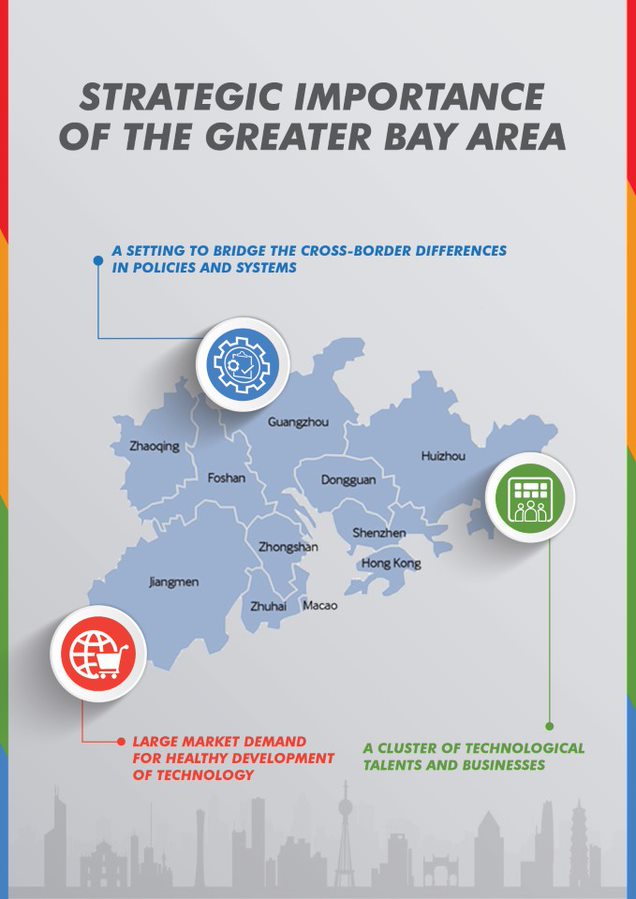
ASEAN – a Larger Market and a Bigger Sandbox
Along the DSR, ASEAN countries are naturally the priority markets for Hong Kong and mainland China. Similar to the GBA, ASEAN can help facilitate Hong Kong’s contribution to the DSR initiative. ASEAN is another huge market in which Hong Kong can expand its tech and fintech businesses, providing great opportunities not only to Hong Kong tech firms and start-ups, but also for Hong Kong to take technology from mainland China to ASEAN countries. Interviewees from ASEAN, such as the founder of Raffles Business Solutions in Singapore and the Managing Director of ADVANCE.AI in Indonesia, agreed that Hong Kong has such potential, but that more has to be done to strengthen regional co-operation.
ASEAN can also be viewed as a bigger sandbox. The GBA is still under a single political regime and essentially the same Chinese culture. ASEAN is much more complicated as it involves different political and legal regimes with very different cultures and numerous currencies. If Hong Kong can help iron out not only the physical and technical barriers but also the cultural and socio-political ones across ASEAN countries, it would be a significant step towards the success of the DSR as a whole.

Hong Kong’s Positioning
Based on Hong Kong’s strength, this study has identified the following areas in which the city has the potential to develop further as the digital gateway of the DSR for policy makers and companies to consider. Yet it should be noted that the history of Hong Kong’s success is built on the agility and flexibility of its enterprises to spot business opportunities and quickly adapt to change, and not on specific instructions from the top. Hence, the identified areas should be viewed as general propositions.
1. As a Cloud Data Centre/Platform
A huge amount of data is generated each day worldwide with tremendous value if organised and structured well for use. Recent technology developed to protect confidentiality and data privacy uses homomorphic encryption developed by MIT scientists, which enables computations to be carried out in an encrypted environment. As such, analytics can be performed on encrypted data.
Hong Kong can consider building up a cloud data platform to encourage the sharing and use of data among DSR countries. Hong Kong will be in the best position to host a DSR cloud centre giving it full control of the data and information and upholding its integrity. The city can also get more involved with the Open Data Institute to come up with data standards. While a cloud centre involves huge investment, a government-backed (either government-owned or operated via a public-private partnership) centre for DSR is deemed to be important.
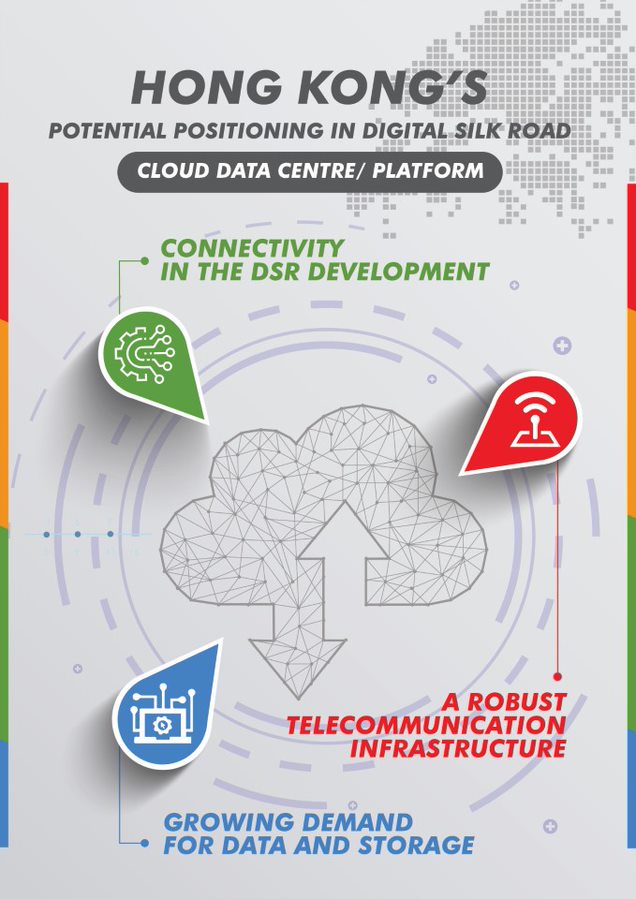
2. As a Digital International Financial Centre
Without dispute, Hong Kong is already an international financial centre. It can draw international capital to support its start-ups and innovative projects as well as capital investment for digital infrastructure along the DSR. To move to another level of being a Digital International Financial Centre (DIFC), there are at least four aspects to work on. First, a DIFC should naturally be a fintech centre providing fintech-based financial services. Second, Hong Kong can be an offshore RMB settlement and clearance centre for DSR online and mobile payments. Third, a DIFC should have an exchange to trade digitised assets, which become a new class of asset generated in the digitisation process. This will also help move Hong Kong into a “token economy”. Lastly, being the digital gateway of the DSR, Hong Kong would have a unique opportunity to launch a cryptocurrency to support DSR transactions.

3. As a DSR Arbitration Centre
Given the credibility built on the common law and an independent judiciary, and being the digital gateway of the DSR, Hong Kong is in one of the best positions to become the DSR arbitration centre. Digital technology itself will transform the arbitration process. E-arbitration and online arbitration could become possible, for instance. Yet there are difficulties in implementing standards for online dispute resolution in different legal environments across DSR countries, and Hong Kong should move fast to define best practices and create a workable environment.
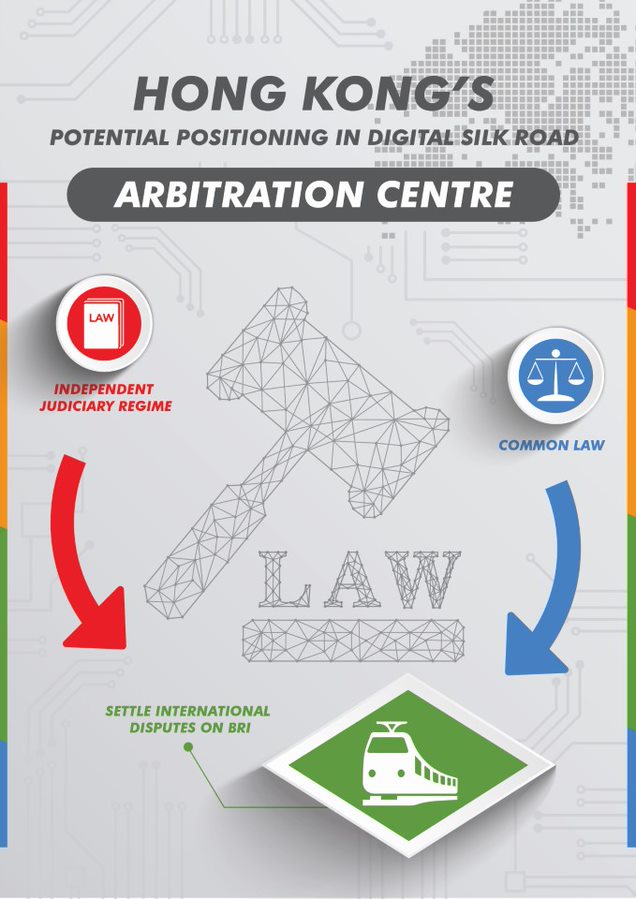
4. As a Smart Entrepot
Hong Kong has been an important entrepot with well-established logistics infrastructure and port facilities. Uplifting the handling power and efficiency of Hong Kong’s seaport and airport for cargo delivery through transforming our already world-class port into a smart port empowered by cutting-edge digital technology is the natural way to go. With the blockchain technology to empower supply chain financing and minimise the heavy documentation work in import-export trade, Hong Kong can digitally transform itself from a traditional entrepot to a full-blown smart entrepot.
Along these lines, Hong Kong should work on strengthening the hyper-connected network in the GBA and connections with other neighbouring markets to create a highly efficient logistics and supply chain – in particular, to support the growing expectations for on-demand delivery amid the rapid development of e-commerce markets in the region.
5. Smart City, Smart Economy
Smart city development per se is a key objective of every government to deal with various difficult urban problems. Hong Kong should develop into a smart city, as a showcase to ASEAN countries and others along the DSR.
To support its role as the DSR gateway, Hong Kong should develop towards a smart economy that needs four factors: market, capital, policy and talent. Being part of the GBA and with links to ASEAN and other DSR countries, Hong Kong has a large market in which to grow. With a business-friendly and efficient administration, the city has supportive policies and an environment conducive to its growth. Being an international, cross-cultural city with world-class research universities, Hong Kong is able to groom, attract and retain talent and entrepreneurs, both domestically and globally.
A point to emphasise is that the talent required isn’t just in the field of technology, but also people with entrepreneurial minds capable of identifying business opportunities and leading groups of tech specialists in applying digital technology to transform and grow their businesses. Hong Kong’s small and medium-sized enterprises (SMEs) are well-known for their agility and flexibility in a changing environment. Their digital awareness and active involvement in digital technology could provide fundamental and important contributions to the digital transformation of Hong Kong towards a smart economy as well as to the digitalisation process of SMEs across the DSR countries.
LYNK, a global digital platform that connects people to experts for advice and insights, and Intria, which provides travel technology consulting and solutions, were interviewed for this study and provide good illustrations of how Hong Kong’s home-grown companies can contribute to the DSR initiative.
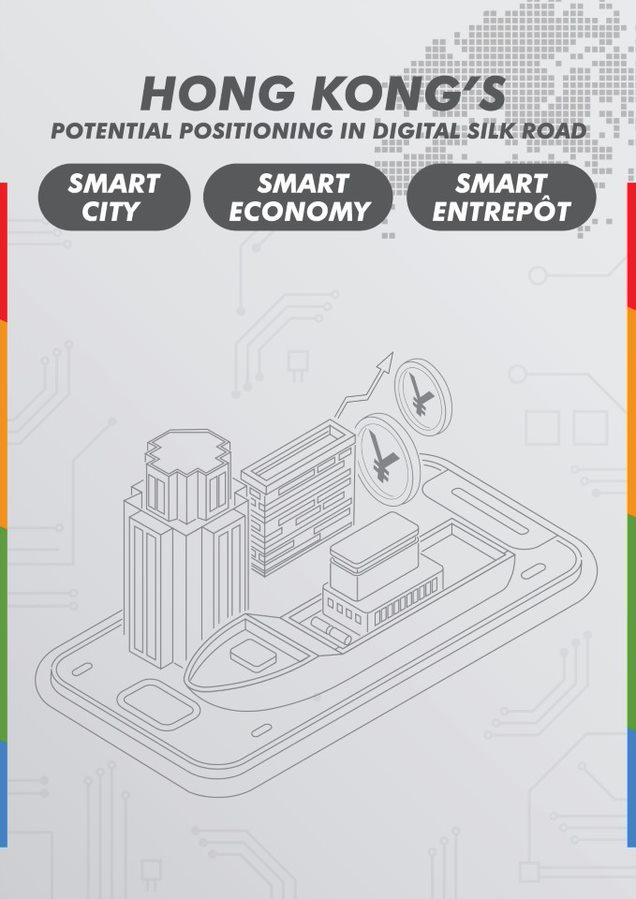
Challenges Facing Hong Kong
Hong Kong’s ride along with the DSR initiative faces various challenges and difficulties, including competition from other cities in the region, but its biggest hurdle is perhaps the macro environment.
The local macro environment essential to Hong Kong is the one country, two systems structure, and its importance to the success of the city in capitalising on the DSR opportunity cannot be overstated. The key is not how good Hong Kong believes it is in upholding the structure, but how its efforts are perceived by DSR countries and the rest of the world. Therefore, strengthening the credibility of the structure and the confidence in it is essential.
The global macro environment detrimental to the DSR initiative is deglobalisation, in particular the China-US tension. One view is that a decoupling of the two nations may lead to the possibility of two competing tech systems – those of China and the US. It would be highly detrimental for global development if the digital world were to split into two, no matter which system dominates. The DSR initiative should aim to help form an ecosystem in which a universal tech system can develop, and Hong Kong could contribute to this, and to the world, as the two tech systems could be complementary to each other.
As one of the interviewees Dr Winnie Tang, a smart city expert, pointed out, “co-opetition” helps healthy development. Through co-operative competition, competing parties can both gain. In fact, digital technology is developing fast, and so are the applications. No one has everything and focusing on mutual competition will only lead to protectionism, causing a shrinkage in the global digital economy. Genuine collaborations help grow the ecosystem in which everybody gains. The DSR initiative, after all, aims to “construct a community of common destiny with mankind”.
Conclusion
For the DSR to succeed, it needs both the technological infrastructure and the superstructure of mutual benefit among DSR countries. This gives Hong Kong a unique role to play as a super-connector and the digital gateway of the DSR, given its strong ties and credibility with mainland China and the DSR countries. Leveraging such a unique advantage, Hong Kong faces a once-in-a-lifetime opportunity to contribute to this era of global digital transformation. If Hong Kong gets it right, it could fundamentally transform itself and make a quantum leap towards a completely new level of economic growth as a “smart economy”.
Click here for full report.
